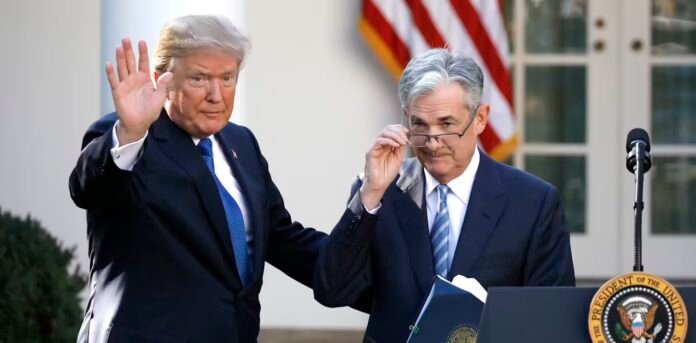During his presidency, Donald Trump frequently expressed dissatisfaction with the Federal Reserve’s actions, which he believed were detrimental to the economy. Despite his complaints, the Fed largely ignored his concerns. If Trump secures a second term, he may take steps to ensure that the Fed is more responsive to his directives.
Both Trump and his running mate, Ohio Senator J.D. Vance, have argued that the President should have greater influence over one of the Fed’s most significant powers: setting interest rates.
“I believe the President should have a say in that,” Trump stated at a recent press conference at Mar-a-Lago. “I think my instincts are better than those of many people who would be on the Federal Reserve, including the chairman.”
This approach would mark a significant shift in the U.S., with potential global implications, as the Fed’s political independence is seen as crucial to its ability to manage U.S. monetary policy effectively.
Several economists expressed concern that Trump’s proposal could lead to Presidents pressuring the Fed to adopt policies that might be politically advantageous in the short term but harmful to the economy in the long run.
“This opens the door to potential abuse,” warned Robert Barbera, director of the Center for Financial Economics at Johns Hopkins University.
Traditionally, Presidential influence over the Fed has been limited to appointing its chair and board of governors. It is not uncommon for Fed chairs to be reappointed by Presidents from different political parties. For example, the current Fed chair, Jerome Powell, was initially appointed by Trump and later reappointed by President Joe Biden.
Short-Term vs. Long-Term Concerns
Economists argue that politicizing the Federal Reserve could be detrimental, regardless of which party is in power, due to the delicate balance the Fed must strike between pursuing maximum employment and controlling inflation.
Managing inflation, in particular, is a challenging task. The Fed often has to make decisions that may increase the risk of a short-term recession to control inflation in the long term.
During most of Biden’s presidency, the Fed has been grappling with the highest inflation rates in over 40 years. To combat this, the Fed has primarily used the Federal Funds Rate, the interest rate that banks charge each other for overnight loans. Raising this rate makes borrowing between banks more expensive, reducing the amount of money in circulation, which can help lower inflation but also raises the risk of a recession.
Ryan Chahrour, an economics professor at Cornell University, notes that politicians often operate with “short-term incentives” and prefer economic growth, especially in the run-up to an election. This preference typically leads to advocating for lower interest rates.
“This often results in an inflationary bias, where the central bank allows too much short-term economic growth, causing higher inflation,” Chahrour explained.
Historical Context
The Federal Reserve has not always been insulated from political influence. In the 1970s, it struggled to resist short-term political pressures, leading to high inflation, which peaked at 13.5% in 1980.
President Jimmy Carter prioritized controlling inflation during his administration. After his election in 1976, Carter sought a Fed chair who would fight inflation, even if it risked causing a severe recession. He chose Paul Volcker, then-president of the New York Federal Reserve Bank.
Volcker implemented high interest rates to curb inflation, leading to two recessions within two years. By the end of Volcker’s tenure in 1987, inflation had dropped to 3.7%. “Paul Volcker was the most independent central banker,” said Barbera. “He conquered the great inflation by ignoring political pressures.”
Volcker’s actions helped establish the norm that the Federal Reserve should operate independently from political influence, according to the economists interviewed.
Trump’s Vision
Trump and Vance have recently suggested that they might be more effective at setting the Federal Funds Rate than the experts at the Federal Reserve.
“There are too many bureaucrats making critical decisions,” Vance said in a CNN interview. “If the American people disagree with our interest rate policy, they should elect someone else to change it. Nothing should be beyond democratic debate in this country.”
Though Trump appointed Powell as Fed chair in 2017, he frequently criticized Powell during his presidency, pressuring him to lower interest rates. “When Trump was in office and seeking re-election, he was frustrated that Jerome Powell kept interest rates too high. Now, out of office, he’s upset that Powell keeps rates too low,” Chahrour said.
In essence, Trump has advocated for policies that could increase inflation but boost the economy in the short term while he was in power, potentially improving his re-election chances. Once out of power, he supported tighter policies that could reduce inflation but also slow down the economy, making the Biden administration look worse in the short term. “Trump seems to be responding to these well-known political incentives,” Chahrour added.
Vice President Kamala Harris, Trump’s opponent in the 2024 election, disagreed with his stance. “The Fed is an independent entity, and as President, I would never interfere with its decisions,” Harris told reporters in Phoenix, Arizona, on Saturday.



